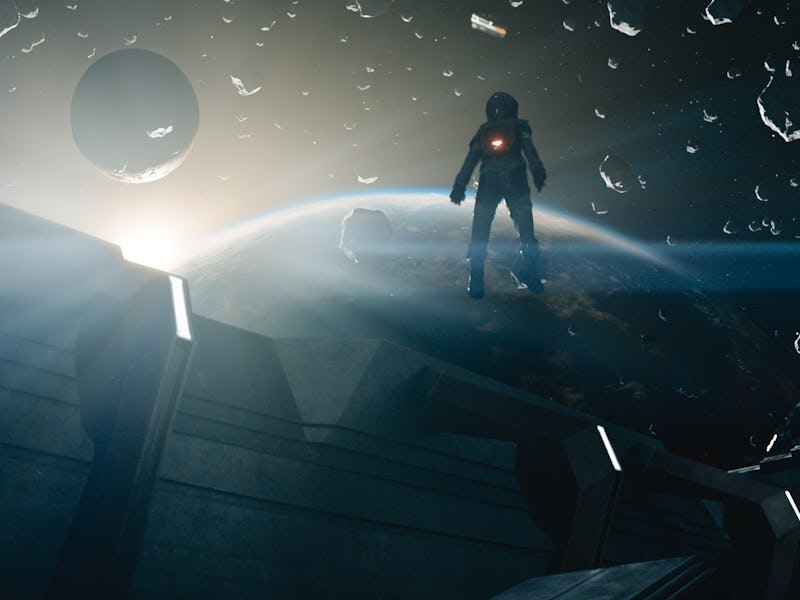Dune’s Most Enduring Trope Is Shaking Up The Year's Best Sci-Fi Show
The Spacers must flow.

In order to survive the perils of interstellar space travel, navigators need a certain kind of substance. No, it’s not the spice in Dune, but instead, a drug called “Opalesk” in Foundation. And, just like in Dune, Apple TV’s best science fiction series is aware that space travel, eventually, has to be free of any kind of stimulants, otherwise, the balance of power will always favor whoever is in control of whatever space stuff is needed to travel between the stars.
With Season 2, Episode 7, “A Necessary Death,” Foundation teases a huge shift in galactic politics that both changes the Asimov books and deftly borrows from the endgame of the later Dune novels.
Spoilers for Foundation ahead.
Spacers versus Guild Navigators
A Guild Navigator issues demands in the 1984 Dune.
In the Dune universe, Guild Navigators use “the spice” to help them make the correct calculations for ships to travel between star systems. Space is folded by the Holtzman engines of big ships like Heighliners, but the Guild Navigators need the prescience that the spice gives them to make all of this space-folding feasible. In the 1984 Dune, David Lynch skipped a step and just said that the Guild Navigators folded space themselves. Either way, long exposure to the spice mutated Guild Navigators to the point where, sometimes, they don’t look quite human. There are no true space aliens in Dune, though casual fans might have believed they were aliens, thanks to the alienesque appearance of the Guild Navigators — designed by ET creature guru Carlo Rambaldi — in the Lynch film.
There are zero aliens in the Foundation books by Isaac Asimov. In the contemporary Apple TV series, this vast continuity has its own version of the Guild Navigators; the Spacers. As introduced in Season 1, the Spacers are genetically engineered to help make all this interstellar travel possible, meaning they look somewhat alien-ish, even if they are technically human. The Foundation show has also established that the Spacers need a pseudo-narcotic called “Opalesk,” to survive, which is doled out to them by Empire. That is until Hober Mallow (Dimitri Leonidas) presents the Spacers with an alternative in “A Necessary Death.”
Foundation’s “No-ship”
Dimitri Leonidas as Hober Mallow, in his ship in Foundation.
In the Asimov books, the Spacers were not as they are depicted in the series. In book canon, the Spacers were also genetically modified humans, but unlike in the show, they weren’t beholden to the Empire. What Foundation the series has done is make the Spacers more like the Guild Navigators in Dune, only in a much worse position. In the Dune books, the spice-reliant Guild Navigators were powerful players in the politics of the Imperium. In Foundation, the Spacers are borderline slaves. What Hober Mallow is trying to convince the Spacers to do in Episode 7 is to reject Empire and join the Foundation, which will more benevolently solve the Opalesk problem.
And, part of Hober’s proof that the Foundation is more powerful, in a way, also comes from Dune. In the last two Dune novels by Frank Herbert — Heretics of Dune and Chapterhouse: Dune — a new way to navigate the galaxy is introduced: the No-ship. Unlike the Guild Navigator-dependent ships of the earlier books, the No-ship doesn’t need spice-addicted folks to do the calculations, and, the ship is also invisible to prescience. Metaphorically, this ship is part of Herbert’s overall point of the Dune saga: That future predictions have messed up the galaxy.
As a metaphoric microcosm, Hober’s ship in Foundation doesn’t pack as much of a philosophical punch, but the in-universe tech is pretty much the same thing. Hober’s ship, decked-out with Foundation tech, can easily jump between star systems, without the aid of the Spacers. This represents a threat to the Spacer’s livelihood, but also, possibly, their freedom.
Foundation has a few twists and turns in Season 2 before we learn more about how Hober’s talk with the Spacers will really shake out. But for now, it’s fascinating to watch this methodical, and smart sci-fi series interact not just with its own source material, but with some of the other greatest science fiction books of all time, too. In this way, Foundation is proving not just to be a great Asimov remix, but a little bit of an homage to Frank Herbert, too.
Foundation drops new episodes on Apple TV on Fridays.
This article was originally published on